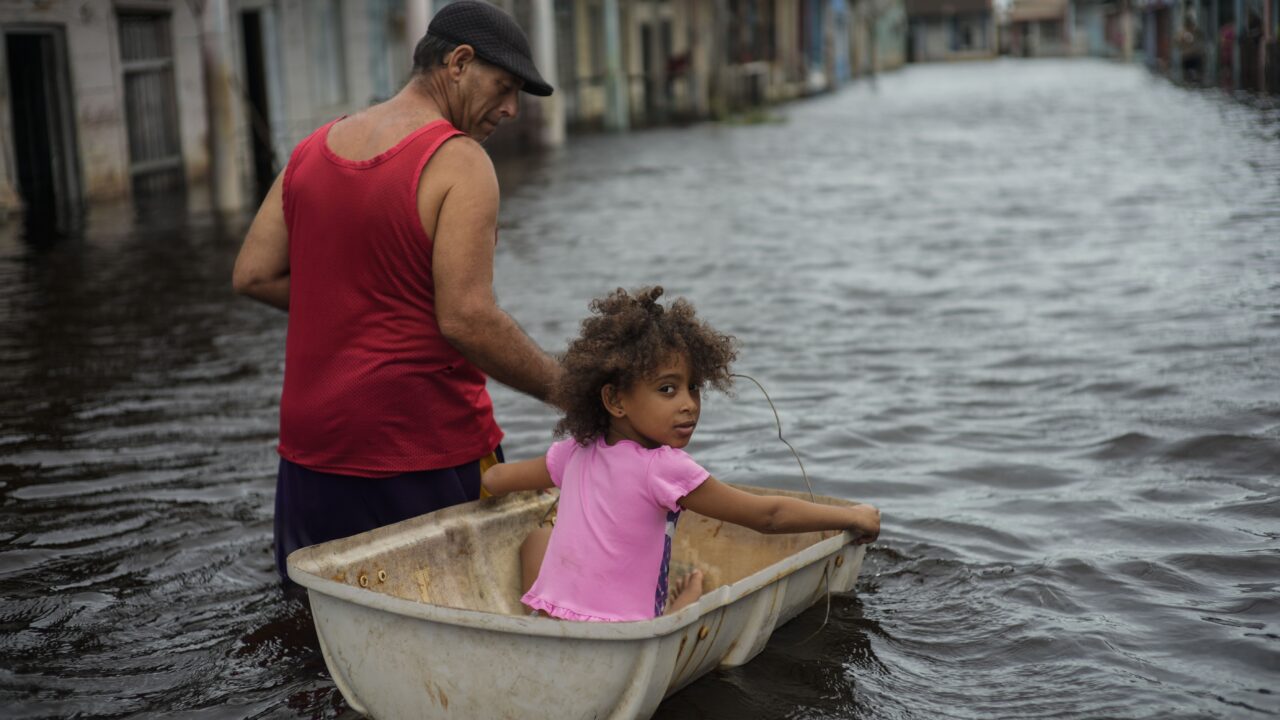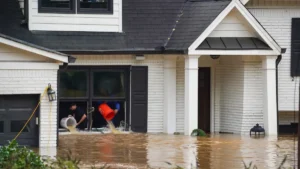The Disaster of Our Own Making Got Worse This Year
How the climate emergency deepened in 2024. Jesus Hernandez guides his granddaughter Angelina in a container through a flooded street in the aftermath of Hurricane Helene, in Batabano, Cuba, on Sept. 26, 2024. (AP Photo/Ramon Espinosa)
Jesus Hernandez guides his granddaughter Angelina in a container through a flooded street in the aftermath of Hurricane Helene, in Batabano, Cuba, on Sept. 26, 2024. (AP Photo/Ramon Espinosa)
Every year, the environmental emergency gets worse. This year was no exception. Indeed, it was one of the most abysmal years yet.
2024 will go down as the hottest year on record, including the three hottest days ever recorded, and the first to have exceeded the 1.5 degrees Celsius threshold targeted by the Paris Agreement. Because that was in part due to the current El Niño warming phase, scientists now put us at a 1.3 C average (sustained across years). It is all-but-certain that we will breach the 1.5 C limit by as early as 2027, and we’re racing toward 2 C by 2050. And that’s under a low emissions scenario that is looking more and more unlikely. The effects will be disastrous, and the possibility of triggering multiple catastrophic tipping points — such as shifting the thawing of methane-containing permafrost and mass coral reef die off — will move from “possible” to “likely.” The latest U.N. Emissions Gap Report projects temperatures to reach 3.1 C by the end of the century on the current trajectory, while a Lancet report found health threats due to climate change are at record-breaking levels.
In 2024, new scientific reports also found that a collapse of the Atlantic Meridional Overturning Circulation — better known as the Gulf Stream — seems much more likely in this century than previously thought, prompting an open letter of concern from leading climate scientists. If the AMOC collapses, the tropics would warm, while Europe would drop 5 to 15 degrees C, with severe adverse effects on agriculture. Sea levels would rise on the U.S. East Coast, rainfall patterns would change, and extreme weather events would be likely to increase.
2024 will go down as the hottest year on record.
Speaking of extreme weather events, southern Africa is experiencing the worst drought in a century; Kenya’s is the worst in 40 years. In the last year, the Amazon rainforest burned at the highest rate since 2005, sparked by a historic drought for the second year in a row. Spain was hit by the deadliest floods in decades, while hurricanes Beryl and Helene tore up the Caribbean, Yucatán Peninsula, Gulf Coast and Florida. (All told, 2024 hurricanes caused about $500 billion in long-term damage to the U.S. economy.) While extreme weather events are not new, they are increasing over time, with 90% of the costs falling on lower-income countries.
And what are global leaders doing to arrest these trendlines and prepare the most vulnerable countries? The COP29 climate summit ended with rich countries providing a mere $300 billion in climate finance to developing countries, which were asking for at least $1 trillion (predominantly in the form of grants and concessional finance, which the rich countries resisted). The COP16 biodiversity summit, less discussed than COP29, collapsed without a consensus on nature funding. In the end, the rich countries refused to cough up the finances required to meet the biodiversity commitments made under the Kunming-Montreal Global Biodiversity Framework.
Other scientific findings also continue to flash red. Johan Rockström et al.’s Planetary Health Check report found six of nine planetary boundaries are currently transgressed (with an additional boundary approaching transgression). William J. Ripple et al.’s 2024 State of the Climate report found 25 of 35 planetary vital signs reached record levels last year. Only “transformative science-based solutions across all aspects of society” can arrest the march toward “irreversible climate disaster,” it concluded.
The oil industry, meanwhile, heavily represented at COP29, has decided to scale back its minimal contributions to renewable energy and to press ahead with new oil exploration and production. Instead of putting money into reversing biodiversity loss, rich countries continue to subsidize not only fossil fuel energy, but other environmentally destructive practices, such as overfishing and unsustainable agriculture.
We don’t have the luxury of collapsing in resignation.
Within this context, the election of Donald Trump couldn’t have come at a worse time. Trump is set to withdraw from the Paris Agreement, roll back environmental regulations, expand oil and gas drilling, reduce green energy subsidies, undermine animal welfare, and weaken the Endangered Species Act (protecting over 1,000 plants and animals). The criminalization of environmental defenders is also likely to worsen under the incoming administration.
And yet, we don’t have the luxury of collapsing in resignation. We have to find a way to push through a pro-environment agenda even with Trump in office. That includes thinking big, beyond tinkering at the edges of the current system. Despite warnings from the scientific community, leaders of the rich countries, joined by elites across the Global South, show no sign of working to build a new way of life that redistributes resources from rich to poor, between and within countries, and replaces a system of domination with one based on harmony with each other and nature. The work ahead remains to build a just and sustainable transition and to push a transformational agenda that challenges our way of life in the direction of radical equality. Fighting to construct a fair and sustainable alternative without replaying the dystopian failures of 20th century state socialism will be no easy task. But there exists a wide range of movements for a deeply egalitarian society lighting the way.
Your support is crucial…With an uncertain future and a new administration casting doubt on press freedoms, the danger is clear: The truth is at risk.
Now is the time to give. Your tax-deductible support allows us to dig deeper, delivering fearless investigative reporting and analysis that exposes what’s really happening — without compromise.
Stand with our courageous journalists. Donate today to protect a free press, uphold democracy and unearth untold stories.









You need to be a supporter to comment.
There are currently no responses to this article.
Be the first to respond.